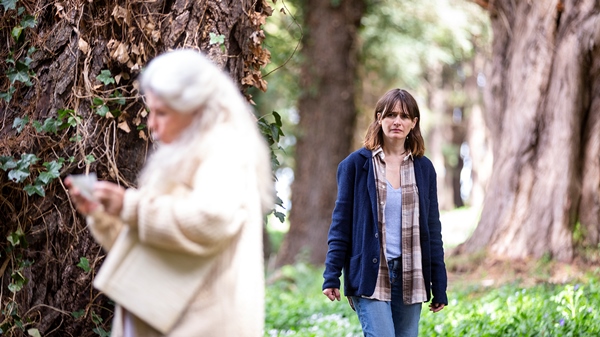

It’s tempting to compare Relic with Ari Aster’s Hereditary. Both are surprisingly intense horror movies from first-time directors, this being the debut of Natalie Erika James. But Relic is as horrific as it is tragic, an allegory for losing someone to cognitive decline and the struggle to comprehend its impact on family members. Here terror manifests itself as generational trauma and guilt. Guided by strong performances, this is one of the most haunting films of 2020 so far.
Opening with a naked octogenarian woman staring blankly at her Christmas tree, the viewer is left on edge. After the woman, Edna (Robyn Nevin), suddenly vanishes from her rural home, her daughter, Kay (Emily Mortimer), and granddaughter, Sam (Bella Heathcote), drive up to the house to aid the authorities in their search. What they find upon arrival is haunted and unsanitary: furniture is overturned, fruit has gone bad, and a strange black mold is discovered in one of the closets. As decrepit as the house looks, we’re about to learn that this rot goes metaphorically and literally deeper.
A few days later, Edna shows up like nothing happened, unwilling to discuss where she went or how she acquired a large dark bruise on her chest. Worse, these memory lapses are interpreted by doctors as possible dementia, not helped by the various scribbled Post-its left around the house. Some of these notes warn against following “it,” though no one makes any effort to understand Edna’s fear beyond a phone call Kay remembers her mother making about hearing movements in the house.
Despite the two agreeing to look after Edna until further notice, Kay and her daughter eventually butt heads over whether these events warrant putting her in a nursing home. It’s an uncomfortable dilemma, with Kay believing outside help can better provide for her mother, while Sam, whose relationship with Edna is noticeably warmer, views it as an excuse to dump that responsibility onto others.
Relic never gives “it” a definitive form. Instead it presents evil as an all-encompassing force that’s infected Edna’s home for quite some time. An occasional humanoid shadow aside, the house is Relic’s true adversary: a mess of untidy boxes, ominous corridors, and rickety machines that can’t help but invoke that childlike fear of being watched despite knowing you’re alone. This disorderliness is matched by James’s use of tangible and spiritual motifs, such as Kay’s nightmares of an old cabin, whose stained glass window now hangs in the house like a ghostly memento. Against a deeply claustrophobic atmosphere, the real terror derives from watching Kay’s already arduous relationship with her mother deteriorate further, and that’s even before she realizes supernatural forces are involved.
Even more disturbing is how the film casually blurs its signs of medical illness and supernatural threat to the point of feeling interchangeable. Aside from a few neighbors and the local constable, viewers only interact with these three women, and James makes sure we understand the fractured maternal bonds before twisting the screw on Edna’s condition.
The director evokes Stanley Kubrick’s The Shining as much as she does Hereditary, deliberately leaving it ambiguous as to whether a possession is happening. At one point, Edna lashes out against Sam over a ring that, only a short while ago, was given to her as an act of compassion. Was her outrage caused by the house or mere forgetfulness? We don’t know, and Relic never provides an answer, leaving us to contemplate more disturbing questions.
Mortimer, Heathcote, and Nevin all give fantastic performances, delivering enough nuance and pathos that make their predicament feel credible. Everyone’s reactions are just raw enough to convey the tragedy of this melodrama. Yet so long as the three remain in proximity of Edna’s house, made eerier by Charlie Sarroff’s visuals, it always feels like the past is haunting them with an omnipresent gaze. By the time larger secrets are revealed, the shadowy mold’s influence manifests itself in a mesh of body horror and topographical distortion that’s straight out of a Lovecraftian labyrinth. To pull this level of unease without a single annoying jump scare is a rare feat that studio films with far bigger budgets have failed to achieve.
At just under an hour and a half, Relic offers a uniquely unorthodox “monster” story that is at once terrifying and heartbreaking. I can’t say for certain if it will receive the attention Hereditary received, even with Jake Gyllenhaal and the Russo brothers serving as producers. But this is original horror done exceptionally well with a limited cast and setting, and it deserves both the critical attention and discussion.
















Leave A Comment